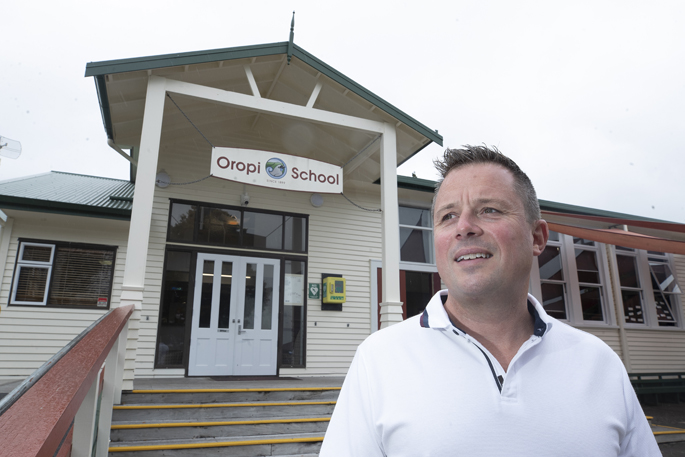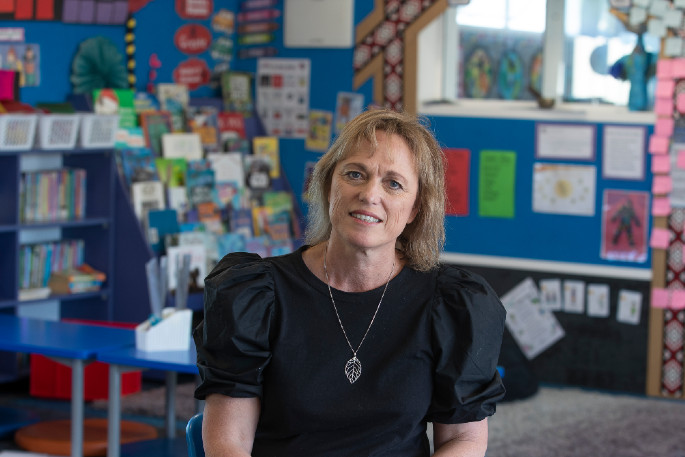Home education applications that had a huge increase under the red setting of the Covid Protection framework have dropped with the relaxing of rules.
New Zealand Rural School Leadership Association president Andrew King says rural schools saw an increase in applications from three to 20 per cent after the school mask mandates were announced.
'It was reactionary behaviour from parents thinking that home schooling was their only solution until we educated them that 'no, that doesn't have to be the solution',” he says.
King says schools worked with parents and caregivers on at-home learning options, which was also supported by the Ministry of Education's Bay of Plenty office.
'Their position was reemphasising to parents the message that if you're home schooling application is because of the red level alert requirements, we encourage you to go back to your school and engage with them for at-home learning.”
Under the red setting students from year 4 to 13 were required to wear masks indoors at school. New Zealand moved to the orange setting on April 14, removing that requirement.
 Principal Andrew King wants schools and the Ministry of Education to work together to prevent 'reactionary” home education applications. Photo: John Borren/SunLive,
Principal Andrew King wants schools and the Ministry of Education to work together to prevent 'reactionary” home education applications. Photo: John Borren/SunLive,
King, who is also the principal of Oropi School, says there are less home education applications happening now.
Tauriko School principal and Western Bay of Plenty Principals Association president Suzanne Billington agreed there was an 'upsurge in people thinking that they would home school” in term one but she wasn't sure how that would look long term.
'Quite a few parents were teaching their children at home during lockdown, but over that time, schools were supporting them with the learning,” she says.
'As far as home schooling is concerned, they are doing that by themselves without school support, so they may find it's a little bit more tricky than what they thought.”
Ministry of Education data shows a steady incline in nationwide home education applications from August last year. The applications reached their peak in November 2021 at around 900 applications.
National data for November 2020 shows there were around 200 applications and in November 2019 there were around 150 applications.
As of May 5, there have been 2328 home education applications nationally, with 1500 approved, compared to 2021 where there were 3834 applications with 3328 approved across the entire year.
Localised data for the Bay of Plenty shows there were 31 applications in January this year, 110 in February and 52 in March.
Of these applications, 25 were approved as of March 4. April data for the Bay of Plenty was not yet available, and applications take the ministry four to six weeks to process.
Nationally there were 781 applications in January, 744 in February, 548 in March and 255 in April.
Billington says losing students to home schooling can impact school funding and staffing.
The ministry provides operational funding based on the number of students a school has, she says.
'If you've lost quite a few students, that means that operationally, what you were expecting to have as income from the ministry, won't be the same as what you actually get.”
Funding for staff is also based on the school roll, with July 1 being an important date that gives an indication of what the roll would be like next year.
 Tauriko School principal Suzanne Billington says there was an 'upsurge in people thinking that they would home school” in term one. Photo: John Borren/SunLive.
Tauriko School principal Suzanne Billington says there was an 'upsurge in people thinking that they would home school” in term one. Photo: John Borren/SunLive.
'If the numbers [of students] haven't improved by July the first or you're down significantly, then that will impact your staffing funding for the following year,” she says.
Billington says: 'Rural schools notice that more than others because they too are staffed on the numbers of kids, but five kids can be quite a difference in rural school.”
Education Ministry Operations and Integration leader Sean Teddy told Local Democracy Reporting home education applicants aren't required to provide reasons about why they are applying.
'Home education is not a short-term solution. To home educate well, parents need to thoroughly research and plan their approach,” says Teddy.
Parents or legal guardians must still meet the legal requirements that their child will be taught the curriculum as regularly and as well as in a registered school, he says.
'We know the physical, mental and emotional wellbeing of students in school is beneficial so all those students that can attend should.”
King says schools and the ministry need to have follow up conversations about home schooling applications and the approval process.
'The ministry asks schools for their perspective on the home schooling application. But that doesn't mean that it would influence whether an application was declined or accepted,” he says.
'Schools should have more influence on the parameters and criteria for approving home schooling applications, because sometimes as the pandemic's proven to us, the applications are reactionary rather than genuine.”
King says there were genuine applications, but schools and the ministry needed to make sure reactionary applications didn't happen again.
In response to this, Teddy says: 'When the Ministry of Education receives an application for home education a letter is sent to the school where the student is enrolled school informing them of this".
'The ministry requests information regarding the students' educational achievements, and other information which may have relevance to our consideration of the application for exemption.
'The input provided by schools is considered alongside the application to determine whether the student will be ‘taught as regularly and as well as in a registered school'.”
Once a decision was reached the student's enrolled school was advised of the outcome, he says.
Teddy says the ministry worked to ensure whānau knew about all of the educational options available, to allow them to make informed decisions on their child's education
Public Interest Journalism funded through NZ On Air.




0 comments
Leave a Comment
You must be logged in to make a comment.